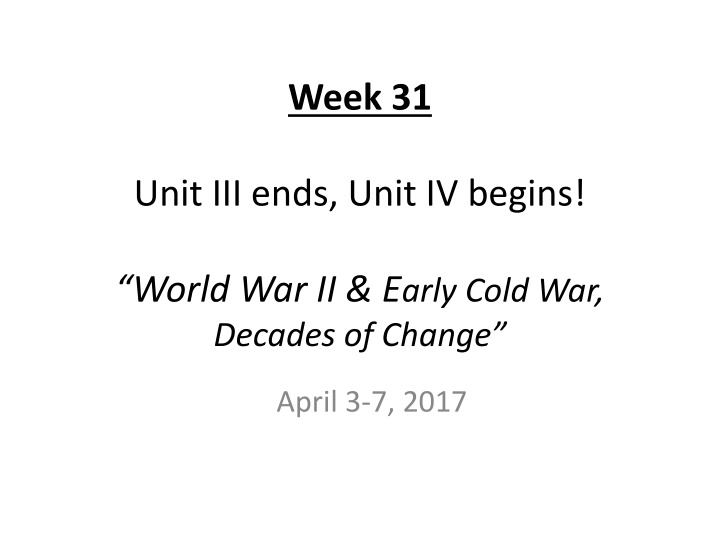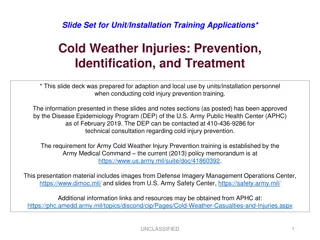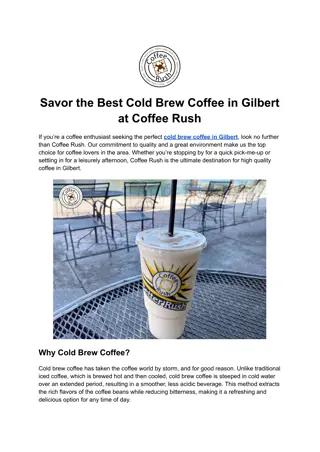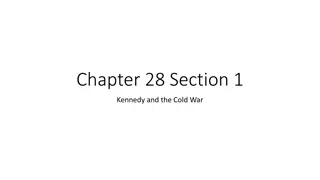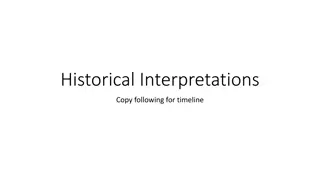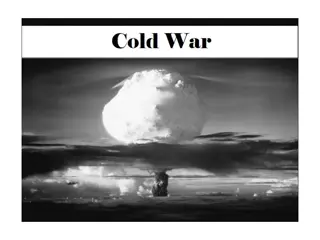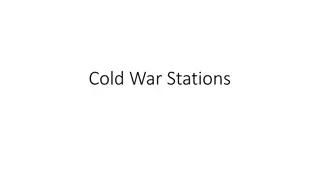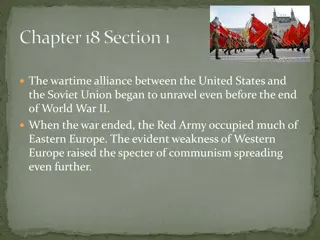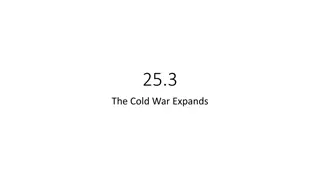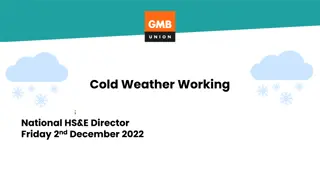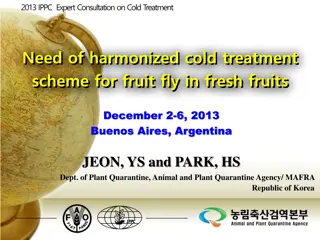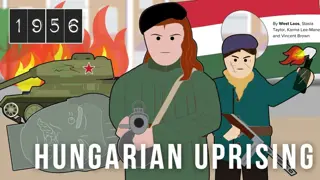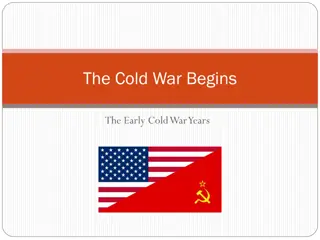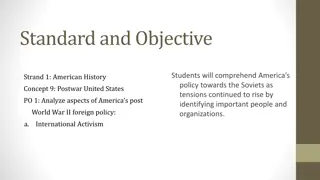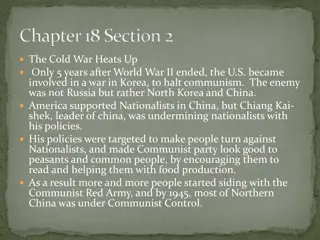Decades of Change: World War II & Early Cold War
This week marks the transition from Unit III to Unit IV, focusing on the pivotal periods of World War II and the Early Cold War. The timeline spans from April 3-7, 2017, highlighting significant global events that shaped history. Explore the intricate dynamics of warfare and political tensions during these transformative decades.
Download Presentation

Please find below an Image/Link to download the presentation.
The content on the website is provided AS IS for your information and personal use only. It may not be sold, licensed, or shared on other websites without obtaining consent from the author.If you encounter any issues during the download, it is possible that the publisher has removed the file from their server.
You are allowed to download the files provided on this website for personal or commercial use, subject to the condition that they are used lawfully. All files are the property of their respective owners.
The content on the website is provided AS IS for your information and personal use only. It may not be sold, licensed, or shared on other websites without obtaining consent from the author.
E N D
Presentation Transcript
Week 31 Unit III ends, Unit IV begins! World War II & Early Cold War, Decades of Change April 3-7, 2017
Why are we here this week? data:image/jpeg;base64,/9j/4AAQSkZJRgABAQAAAQABAAD/2wCEAAkGBhMSERUUExQWFRUWFRUUGBcXFxgVFxYXFhcVFRoVFBUXHSYeGBojGRUVHy8gIycpLCwsFR4xNTAqNSYsLCkBCQoKDgwOGg8PGiwkHyQsLC0sLCwsLSwsLCwsLCksLCksLywtLCwsLCwsLCwpLCwsKS8sLCwsLCwsLCwsLCwsLP/AABEIAMsA+AMBIgACEQEDEQH/xAAcAAACAgMBAQAAAAAAAAAAAAAFBgMEAQIHAAj/xAA+EAABAwIEAwYEAwcEAgMBAAABAgMRAAQFEiExBkFREyJhcYGRBzKhsUJS0RRDYnKSweEVIzPwFoKiwvFT/8QAGwEAAwEBAQEBAAAAAAAAAAAAAgMEAQUABgf/xAA1EQACAQMDAQYEBQIHAAAAAAABAgADESEEEjFBBRMiUWGRFHGBobHB0eHwQlIGFTJDYpLx/9oADAMBAAIRAxEAPwBI4Y4bZuEhwKVKe6tBAiSDBChy5x4UExXCFMKyqUhX8qpI8xyrayx19lKUtqyhKs0ADvE/n/MOUGo7+67VxTkZc5KiBsCdTHrNdtaTbs8SfcLSnFWLS8caOZtakHqkkfY1oG69kojTHWDujXhfxJu24C8ro/iEH+pMH3mm3DPihbLgOpW0evzp9x3vpSbwtYtOSopOZG+vdOaRt13obi+HoaWUpUVEHUREeE86i2qXKiNuQLzt+H4qw8JadQvwSoT/AE7j2oihNfOSTBo5hvGV4zAQ8ogfhV3x7Kn6VjUSJ4VBO7JrcVy7Dviy4NHmUq6qQSk+xkfamjDviFaO/vOzPRwZf/lqn60raRC3CNQrMVVZvUqGZJCh1BBHuKlD1aJ68kyVC4xUnbV5SqYsFjKFw3FVCmaJOCardlrVSSNzmQBitssVYVUSqO14G60wE1qpNZzV4rrNk3fKbjetTstGs5ZqZGlawxPBp79nqFxirgNaLRSgDGF4Av7PnQ02xpndbmqblvVaNi0WReBk29TJs6IC2qzbMA6RWsZqwYMLBFRnCoppbsRG1bKshG1SmpHgRQXhZ5CvU1otI5V6kmpGAT57vLNTSoI05GoYrqvw34gs7tKbPEG2yUT2Di9PmmW1H1kTz8YpR4/4N/065LYWFoOqDPeAOwWnr4jQ+Gwqp1vH3bjMBkxuEucL8FIuAHQ6lbcKC0QUrQspIAI1BEmQZ1il7F8CetlBLqQCdoUkz6AyPWr+C8ZPWraW2UoAz51kiS5yyqJ2TAA0131ofjF6l19xxIKQtRXB1IzakTzgk05ab7zfiLJUD1lVu4UE5QogEyQDGvWt7m6U4cyjJgAnmY0k+MVEaxRGmBmZvm0VkU18IYQy8O0hWdswoGCgkgwRp56UGxnDUMrKUuBZBIIAIy+BO01MSC22HYhby9hLrSmyHAkFXcnYkaHWNoMa+FCb1kJWUpmAY1ifpUArc60r4c3Jhd5cWk1nibrJltakH+Eke8b0y4d8S7hGjgS4PEZVe6dPcUrs2ilyEicqSo+Q3NRARrQNTIhBp13CuN2nUFZCmwkpSSrVIUoEgZh4JPIbUeaxJKhKVBQ6ggj3FclZvmVMBswkk5yE90ZhIGu0xQu3xVxpRLalJ8jB9Y3pKvnIhMmMTt/7WK1VeAGub4PxTcvKDaW1OqOwQklXskU8WHBV+9BWEsg/nVKv6Uz9YqkVEAuTJCjXtJ14iJ3rRV+KZsL+HbLerqlPK/oT7AyfU0dYwG3R8rLY/wDUE+5oW1iDgXmjTueZzsXgNb/tFdLRbIGyUjyAH2rZTIPKl/Gj+37w/hT5znCHhVy3UDTe/gbK/mbT5gQfcUPf4VR+BRSfHvD9aIapG5xB7hhBBar3Y1M9aOtfMnQcxqPM9PWoEX6Dsoe4ou8XzhChUbIU+0idtaqG11oumFba+VTt2g50QrATO6aCE2JI2q1Y4URqaMtsCrCWqU2oNrRq0fOU2rIVL+wiriEVvlqUuY8KBBi7IV6iJTXqHcYVp8ihZBkb04N43/qLaWrlUuIQEIUd4Eka8yJO/Kk8oMkHccudT31m5bPKQsZVoIkdDAI+hFfQVKamQqxE9f2C2FlCx5HkR1FaJE11Tg3ErXE7VVpdBtNz2fZsvlIncFIJ/MFAa7kEievNeIMHXZ3C2VlJUkwcigofqD4EAjpQ0a9mKOMia6YuI3YT8M3XGnHCptaSypTKm15gtzQpBmCNlAyNzShiWEPW6srzam1ESAoRI6jqKZ+GfiT+yNtMoZBbCip0lRK1lR1KOSYERvMcppZxC57R1asylgqUQpUlREmCZ1mKOl3jMd3HSC20AWmGMVdQkJQtSUhWeE6d7TUkb7DesXt6XXCtW6tTGgmACY8Yn1qHLWqqYaQGYG6+JIDWQunThXhy3ebLqSuShbRQoCErUmCpKhvodPOlTE7BLS8qXUuRuUzA8P8A8pCVVLFYZQgAxs4XxptLP++tMlWRGkqywJzR+GevSgGPBPbKSltCAkkDJzHIz4iKHNN00cJcDv37kIGVCYzuK+VPh/EqOQ+lIdFQl4XeEgLAFjhrjywhpClrVoEpEk+grqXCvwRkBd6ojn2TZE/+6+Xkn3ro3DPCVvYt5GUd4jvOHVaz/EengNBRquVUrbjiUKhtmD8GwC3tEZLdpLaecDVXipR1V6miFerUrFTk+caBbibV6ou26VsV0O4T03rBNQm6TtmHuKyXBWbptpuV1E45Ua7kCoHLkV68ICZeXSXxLwiy/KkktOfmT8pP8SdvUQaZl3STz1qvd28pkK5kbUDoGFjOhpdQaLBlNpxG97a3cLayoKB3BMEdUnmKt2fF1238r646KOcey5pt4s4bW42SMqlJ1TrliSJ302FIzvDt0ndpR8QMw/8AjNctqb028NxPtqGv02pQCptJ8jb843YZ8VXkwHm0uDqnuK/uk+wp0wbj21fgBeRR/Cvun0Ox9DXFXLVaPmSpPmCPvWgXRprKqc5+cVX7F0WoF0G0+a8e3HtafSCLgGpO0rhWBcXXNvoF50D8CjIHkdxT/gnHrT0A9xf5T/Y866FLWU6mODPl9Z2JqNPdl8S+Y/MR1ms0NbxIHnWattOJxOWYMhtLy1vpZDEKcc7ZCSpp1Matkie8Tqnwka0L+Jl3bL7NxtlCy+jOHwpX4TlgJBAJAA+bqNKuDFFXCldqvtSe4SozIGkUlcRYKu3UACS0SSjoCYkeeg84FdakLON0lfIusEMOqbVmSYNHLm7F+nvmLhIgKP7wAQEqPWNjQOKlvrNbDmVYyrASr+pIWPoRVdRFbjmKViJVUwpCilYKVAwQdwRV2wtwtaUlaUBRjOqcqfFUAmPSnjCMZtsQt/2e9AS8MuS7CQVpyjKkOwJWgSZkzt0FJWK4aq2eU0spVBHeQZSoHUFCo2I8KCjWIJRhYz1RLi44js58KX02ji4S49nb7NLSswU3BzKB0knMkj+XxpEvbRbSyhxJQtJgpUII8wac0fFNwtOMFtLbJZLLYaJC2iEwhQWTKthO3h0KQpUmTvRUmq57yC4TG2ELPiF9sNpQspS2SQkaAkmSVD8UzzqBas61KiMxJgbCTMComWpoxYYcVEACSSAANySYgVhCrmAzG1oV4L4RXfPhA7qE95xcTlT4dVHYD9K+hcJw5q3aS00kJQkQB9yTzJ5mgfCmCNWjAbb3Oq1Hcq569BsPAUdZNcTU1u8Nukso09oueZdrRx0Deqr+IpT/AIoat0uKzLnKPlTrqfzKjfwqMtKQt4TcvRVQ4gCJOg+9DbplK9JUPBKiPeqr2CZ4BUuOgVlH0TSWJ6RwUCWr7ixpoHvSroNY9qU8Sxu5uUqLRW2gDclSSfICNaYP9Ky6AnTyn00qje2qtFJ1gglI0BA106K+8Ul91oagXiA7h6VLfazKBbRHaBQntiQoZswMpgK2g6gzyoZg/H92wopaf7UDXI4CZHVKtNPca0QxE9hcPdp/wvqK0ufh2ylKiPlMQNelDcI4XtmMzpeDgIhIzIKoOsJAMlWg10ApSVAF8Xp79ZrKS2Iz23xUccSCpvLJ1I1GmhBHLWaJ2nGrZ3BCjpJmB5AUlYRh6QCN5UpevUmYHhR5jDp1itOTi80Y5jXb4wFZYMjwpnKMzYjmZpHw6ygjSnNhYSnflvU+o1jUEYmaKe61pOrDkFOVSQQd53996DvYEUGWyVJ/KdSPI86ziXFLDAlxevIDVSvIUWtLwKSDBAIB7wg6iYI5UjS9pGqACITadlyYISgK0I9DVZ/AGF/M0g+aRPvTE6G1bkecgGqKlDUEjwjnXTV0fEEGomVJEWrjge1UDCSjxQoj6KkfShL/AMNQNWnjP8Y/+yf0p2ekA1kNRvXmooekrpdp6qlw5+ufxiZbi+tdHGy63+ZBzkeY39xXqdA5FerVFRBZWx7wm1tKqd1WkCfMG36zjblv+y3KUuKKW1kQuM0JnUKEiYmukr+Hnb2jkrQ8FJCmignUzM6jQxoB13pcxbCO3aKHAUrGokQQfI1nh/4mP2Zbt3W09i2kN6fMR+Yq5qmTyGuvWvpa5eooKcifOqAhzxFjhu0VbXi2H22y2ApTnbJSAlKdlpKtjMCOcxVv4lYhbuJbcbbbcLqTD4KswyEDLAI11/F12qzxIBfgkrJWnRClamBsFelc6um1pJQqQUkyOU9ftrTaR3kFuYDjbxxI7a5UhUg0bVdi4SAoSRy5+n6UJtbJboORClxvlSVRO0wPCiGP8Pu2TobX82Rtc8pUkEpB5wqR6U9tpNusXnmR3uButJC8pU0oSlwCU8hBI0CgTBB1qswlKlJBVlBIBVBOUdSBqYpp4T46DCF29wgOMPZQ6Nc0Ce8jWAoaHbXKKq8RYEw06Cw6VtqAUFZMo11A3M6b7a8qn75lbY30MPYCNwjJZ/DBwWzjqVoeJCFM9kSoLSScxMgaxEDwNHPh/wAOEOqcdQUlsQkKBBzHnB6D7igmB8c3CEpaUEFgN9kEISEQIjMlQ1zc5MzTpwm7FsN5JJJOpJ6+0e1TVKjgEMYSopItGm1mfAUTSkAa0NsjpNXAmdTXNaVASJ54E5UJHiTy8B41WcbVPL6mijbQAqN0Dx9KURGgwZmy7anxk/TSojce9WLmPA+e9Vu06ppV8xkjcvJ0MfUH0NQ5ZO/pz+mhqwi1QVSUqH2rV+3HJREeVCbwhaLfEGHNnMSnqTrpMbxP2pKdwhG43/LoPeK6IvCEuLBcWtaBukGM2mmo8aDYg7bFWVKktlMgpW2AfJUQa51av3bcGU003RbsLQzBG3TpT61hreQDeBBO2tBrK+Zakl1rfQ5By6d6aK2/FbG2do+PZrH11qdtU/Kia1K0JMNISNKt9mCPOh7GKNK+Xs1c+4Ug/VQ+1WHMRQNzk/mBSPeIrm6ivUqLtYDM1UscSOx4Ya7RTmTOomc7hkDwQnnHtRO4UBpVNvEk6BKgRyggj3FYefmkNX7tQqXv5xlmZrsZXukzSpxPhuZBI0I6femkmqN63IIoaWoYtmX6eqaTAicubxZ9swl5xMdFq+00QY43vE/vir+YJV9xNU8fs8jpihgJrvK5tcGfVKmnrrd0B+gjnafEx0f8jTa/EZkH7kfSvUnpr1M79x1kz9k6JjfZ9zOkYnjannlS6XEBSsh2GUmRpAjSJ8qXuIMOCxPPrUFjd6joY1/Wni74KdWy4sEEJb7RsoOYObGBz+WeW8V9mWWlYT8wHjWcltcRUyvKraadca+HgvbU3Vq4l1SEyAAQtUfM2tPJQEkameW9KmN4dn1GixoR1/zRPhP4iXNklDSUpDaVFS0xq4SdSpR1HdgCIHdFNq03YBqfMSrBbq3EVuG8TVa3SHMxQAqHBrqn8SSOf60ycXfED9qZbDKyhJzpdaIGaQRBKuaSk8jyM1tx7ZoulLvLdMA6rSAAepWcu5mZPOuevI5itADEVCMjkTxuo2dJaWiaN4BdBQ7Bw91XyqP4T+lUuHMDfvDDSc0KAUZAyz+JQmY8fCjPEPCTto8sZFlpKoQ6UnKoGCDmGgOseda7o5sDmCoZeRiM1nwFdIzkt91tOfPMpUnTVtQ0Vpr5A028Pj/aQPEz7mh3AfxCKGUsOJCgmddcygfMxI+tHrW5CzICQCVRlTkkSYJTyMVyHdyxDSsAWxGa3thlBBmauJRVCxWTHQaVdCqRCm7rkChz90eVS3DviPvQ24fPKgJjVE8tQnvGonLhI2FRFknX61SvFRoD9KAiHeWHrkFJgkep3oQ/fpjRURvtJPmTtXn21aSJA5RCZ/vVN1zKP9xM+sTSWI6whNkY4QrSSPf2iobx5L4JUnbnG3mTQq8vJOgAjpH9hVJSp03qZlvxGBrS27c27f4ZO2mvvyFQIvUE6IhM8xr5CKhTaa8qlDVZYDrN3mELPEUJnUyeqZH1oixi6fwkj1/tS7k6UQsmY9aXU0a1VJOZ4V7MAYXVfNqOqRPXY/Sr7N6CInyn7TQsMeFYNgD1HkY/xXLbSrwDLN0OBw1slwHegls042ZSuRzSoSD7bUYbIVqPUdKl+EKtcTxeQPWTSld5CT5gGs/+N2qv3KP6RWhVK/KrKFGvpNNYoARFGpUU+FiPrKznBtof3QHkSP716rwuCK9TjTTyEMavUDhz7mchw17SK6pwVxilppDK0nKCqV5iYkyDljYf5pZt/hNep/8A4+jh3/popbcFXjXzNZh/CpKvoDP0r6Os1Kri8+fpKy4MB8Y36nbhRWsLhSkpUAEgpBMRAE6c6Ur5AMxvTVxbgywiSlSFjUSCJ8Na5+u4JO+vOrtPtCgCJrg7oycL4oEOhK5yEgKjeOcTzirfxA+G/wCyoF1bq7S2cUSIH/FMZcx6EyOUERzpbwpCisV1fBeJFBg27pKmy2psiEykKB1TIg77HSlajcrB0+oh0RuXaZyHhbFDaXSXgCcuYFIMZgUkQfCYPpTBxJxWL4tK7yVBGVbckoCgScyPMHz7tL2K4aph0pVqDqlXIj/vKvMtTqN6zulJ7wcwS7AbDD+Goiun4NohAPJI+1KXA+FsXEJWpYdT3iiBlWkEbHcbgHzp9etAhZAI1MxG1c2sQWNo5LgRgtQkplM+tbuqyiqdrsKleBVqTA5Co2uJQsrSVSToOnWoNDqdqnukhCN5NCM5M0om2I2T3F2BQtd5KttK0cJWYA0FaukAgb0O+89aeusQIGgA9ZPvQS6lW5JNErhokanU7D/PSqZtz60hrHMISj+zgctax2AFXOwg+FQuTypZz1hgSFTOlV1pqxkVVVQM1gUecL6SBZqy1cEc6rBEmsqXzqpMYmAbjkQm3iahzqYYufCgCnzUSrqubqKW1rjidzT01qLYiNKcV8qs2mLxm2+X+4pM/wBQrZOKEAjqIqax6Rx0YOLRl/8AICkk5QZ8aweLSPwfWlZV5Vdy5pis4wDGDR0uWWNquNhzb+tepHeuq9ThUqecb8HphyPxn0KziknXQ7Ef3FFre4zCkwvmf4gSAesbpPjRXD8TAI1+bYczG49N/KqDqOs+SNGMD7KHElK0hSTuFAEH0NJd9wJhodJNq3rruuPMJzQKbku8xS/xEuCCNvsapo6o7rAxBp4m9lwrYAd21YGkaIG3nvUd18P7VZlsraV4KzJPoqdPIihbWKFPONfvRazxjr7f3FNfUVEOCYS0wRiJnFfw0fKFQA6kagp+YHrlOvtNcrDSml5Vcq+p7O5zCaDcTcBWl8CXEZXOTqO6sHqeSvUGq9Pr2/qk9Wnu55nFsBuSlaSkkHQSOh0IrpzN0VEFWpGk9Y60qu/DZ+2dGRaHUhQ37it+aTI9jTRZYe6N0/UUdV1c3WBTUjBhq3JI3ipHs2kHStGGFc6muZlIHmfAVKwlCys8zAlUk+NCrq4CdKKvvkk6baetDbjDSs6DXc9AKna/SNHrKbzmVAjpNR2tvm1OnPzozeWYSjlrufIbeVUQwooTAGoKawrNg10JUQEgnlPjyrCLMr9486ItWZbbIMTO/lp71m1PeQI0gr328D15UPd3xNvB95hKkJBJ32+9D1tEaRrp9aZLjvqjknU+Ajb1J+laMWglSlCSdvDWB9JpFSkekNWiw6mAaHKRP2phXYZwpQ3KtB4GT/agWPL7EiRGvudNPrS6aktYQi9heYbYM+lQvWp1iifYn7Vgt60Q3g3ng9oEVhazsRrWiuHnjtHvRtTdXbYmK17sMyujrKlPi0UlcMXHJI9xUSuHLkfuz9Kem3SJmpg8IqNSL7WnQHada19onOzgtwP3aqru4c8N21e1dJcdFV3HhW3WOHaNQ/0iczes3B+BXtXq6Ip8GvV7vBG/Ht/ZOepx17YPOA9O0UPbWrNtjz4IKbh0EfxqnpGpoWplJMxrU6WweWtEwW07iUrk7gp/OOuF/E28bASopdA/OnX+pMVfe+JCHkZXmXEmd23B0g6KT6+lITE+RFSOqEeNJHhbEN+ytHVG4oB8sQ+9xSyQRkfVBkZ3E+H8Og05dekVQRxo6icogkqJM6mYidNgOQ01oIg1E8Kr752wTIT2XpUW6r73nR8B+LC2yA4yFJ5lKjm8+9IP0romC8b2tzo26Av8i+6r0B+b0r54tXgfSrebmKQWdTzMq9h6TUpuTwn0yPb/AMndOIWVmFBcQddNx+tVsLuiuTOgUdK5zhPHdw0kIWe1QNIWe8PJe/vNMnDHErTilp1QTBCVbeQVt9qp0mpYNsbifLa/sevpvERceY/SPTRnyrDh3PWo2V92pQetdQmccTKGBGvLvHzqt2s/ep31ygjrp6VRTtPtQH0hCbXIzwOQrCfmSBsAaq/tITMmsW2IIJ+YTtuK8SAIW0mQ37+VJ8JPhVY37aUdoogJCTr+nUnb1oDx5ixaRlG6jHpB38KEN3C3bdtB3CQT5mYn/wBY96DdYXnrEm0crG6Btu3UcqVZnFTySCQAOsRp50EwbHHHg46QUBThSlJ5ISkJHrJUSepqBTbrrSWtkoSlMdco3PrrRqzs0NW6QqDvpzkk7Ul6qmNTw4ImS7Dcp0JUPEmJ0A8iaEYjYi6xK3QrZqXnRO0nuo6A6bdDRNOFudmlY7x7ygnmAT9TAFVLd0MrUYhxZlRMzMc5oVrqpuY74bvB4DCt/YS6oIAgJSoCes0LcQRuKxdYyEKzT+EJPkOZqq/iIXz5H30FNSuh6QG0bydbZIB8JqDs1DbehhxVQB73hQHF+IXUQUq1+4pwdbcTw0lQZvHN9bhGg1H1qG1v3IIKQCP12ApEZ44uBuoKHiNfcVs5xg6TIiedS1ERh/pl1HTvfLRzxJ24OUhHd0kAxJ6EzNQ/tb8mWSE6CfM+dKqOLX/zVJ/5ZcfmHsKjZMWsJ06ekbm4/n0jA5cOBJIZcJ8RoPGAZNepfb4vf/NG3IcvSs0juyP6RKhpWbO4fz6R2Pw/szlyuOZVapUFIIIiZHd1jmKmY+GDCvleWnbUhChrsRESDyNW8FvmynOhKQkkZmzug8o+u1NtpbISntEAZd1CIAnXMnp5UbNm043x+pThz9og3fwouE6tLQ74f8avYyPrSzjPCd2wO/buCTEpTnHuiRyr6AYKT3hBkDXqORqhxBcNIRnUQAPxfoRrM1RSoK5GY5P8Q6lQVcA/Sx+2PtPm39hemOzcn+RX6VYbwC4cI7ihy10nnXTr28YcBWQEpmASqJ9joaFu9klXKE6QlSpM9T1GugqmpRVIdLtR6osR94sWfAdwoGCgR/FudNJiKvXXAt42mS3nT1bIX9Br9KbLG2b7pJUnkAVkaDwnTrHjTtZoTliTG29RVgP6YS9r1qBwBbyz+s4GGykkGR4ERFWMLUe3SAojefQE11finhm2fHeTC+SkmFHzOxHnXOn+DH2VlQlxIBktzI8Cnf2qZHtzgzpDtCjrV2cH1Ma7O/UgCHT6zH3owrHFhM5gdOnP3rkV5iJ+XMo8tTVxjFS4pKSsiIMJiARtPU1RvqKt932nOq9ngtkTpjuIOhAlSdZkmRufaqOIYk4lskKG2uv0FKl/iBKky8QAQUpInvdSPxf2qrfOu5QkPTJk6CTz1pXxJNs/jPU+z5Ne4uudTy6mgwxVUnz60IxjEFp0zSo9Ry61UQtRA7++461atytzH7USpsF7jniS4heuuKMkx5mKt4ZxM8gylRnQa6jTQaHyquWDyI9RVBu2WFHUelGpBW0XW05Rw20m/PEcbDja4SqVALH9M9dtPpTJa8ftH5mik/zj7kAe5Fczacc6p+teWp3+D60l6QfBtNOloFb7WvO4tcUANpHZEk5QMqkEQeeYHYdanx+2S8FQ2rODCVCOe531Arh1hjNw0ZQQB0nun/1NPvCXFtxcXA7RaEpCVENyQVrKYCZ2jMJ6686iq06tMXuLCQfDFG30749CIGxJm6bC8zLhTJlQjSOoBMD6Uus8RKBIIPT0rqvF1xcob/2W2y4dFQsyBGpTIGszFcgu88lbrQAA/CYJJPMwZNWaaqtUdPf8ph1VTBP4ftLq8d0OhoJeX5WqT5Dyq9c4G+pKFpT8wJyyJTrAk6a89v8AFZWBXI3aPuk/3q1Sg6j3iK2oLGwv7SoH62/aa85hT6dS2oelVHEqG4IpoCtwZN8Q69D7Qi3eVO3fiQKFN5uhqRCljXLQNSEspa6oLc+0Iv3GvdB9qxUTF0vYp0r1JIti06Ac1PEGI+lp0vB/iW4PmYQRpJBKSY56zT3gnxNtHISvM0T+aMv9QrjbCtKlSa5brm64ncPY2mq0wDz5j+Wn0lZ3jZbCm1JUk7EGRr4ilfifHWkFQUtICcpIOkKVMb+RrkdtirrI/wBt1bf8qlJ+xqne8e3RV3nc/wDOlKtvEiaq0tRt3i4HlPn9b2EdMNwqA388GPX+sWzgUcyMqSeQM9SlP9+dam8tSCorbGgUTpOsb9TtpvXPnOKXXB3lCPBIAqobjMJkmqWqG/E9Q7OUoLvn0nVMLvbTL/yNQZ+ZSAVeYnmeVNNlfM5RlKDpPdhQHnG1fPwukbR9PpUiL8DUd2PGPtUlVGfiO/y6k3+7PoBDzTkkgQDlE9Z6edSKwpo/hHMb6+lcf4f4zcaI1DqBulWvso6iutcNcZWl1CUlKFx8ioSfJPX0qOxU2cfWRars6rQG9fEvmIt8S8N2rkrcQk5E5VKkpIG4MgiktvhO0XPZPqRlVBKiCBJ5K7vtNdnxK0aOhQkhWhBA18653xJw5atPNqVkDaT3UaAFajpm67be9dGi427GkS1XQ7li3dcGITJTcAkjQSoKXH5E6lQ8tKG3+GdgjMp5OY8s/f1MR4f4NNuLXtitvtF9mVEKAM98xKTBBmKRL0sOEJSSEgnKkKVA/q/7pTHprfF7Sml2jWB6X9oHct+0d1WVE6eg60QsuH8+gc2JmINT/wClM6aGT0V9hV+1wpuAAVgCdlETO8kUFWuAvhJH0hojEliBc+phO24DKmpQ+c3RY09CNvalK7wJ0PLRKiUmCU94A9JH2roGFWSFNFOd3QZY7RQ066c/Glq/sGmni2VOQRonOSe8OQH96i0+obeyk3PyjGquwCvkD1tF39kWPxKA6xp/+1Ou3VlIzmesbU1vYQ0pSFZljKABlVECI6fUdaJXfBjTyFSpzMRorNrHIbajz18aNtcgtu/CPWsibgVP/YzmakKOgXpt5+tTreWgBKSJj18/Crt5w8lC47Q6HZQ/Txqv/pDiSohWYwCSnvZRPPpV4qIwvf7RKMw4BBP/AC6emf51hrCuMLphBCsjojQKCiZP8UyfWoMXYXcIQ6l5Ac1K2xKADyKRrm8TPpQhq3MnvnXyrC2SPxn6UkUUV9yWB+Uc9AMtyp9x78wui7uUp3agDeVA6c/+9KjsMRuyT+IwTlVASkcio5RqeWsnwqlZ4upOitQPcU0YddNOJ/5deh7p+u/pXm8F7qJz2o38SkwWl+6IHaIbOslWaIG+wHT7Uv3i3lLCnEgjXKk6ADy3966AbRI5+XjQ29s0Emf++VLSuEa+0TO6D43GJS3V8wK83dKH4Z9aNX2FaykyKFuIANWpUVxgQyjqbhj9popTkaRr9KzW7NwBXq3cR0jRSRxc1CPrOgXfBl00mS2VDqiVf2mhIGtd6t16AEUPxTgq2uZUpBSr8yDlPryNcbxTr6X/ABABiuv1H6ThmJ3GVOlAFXEnUU+8S8HFBUUuHKnQhaSDMxAI0V56Cg9pwsoEFSVEETASSfCa6NJNiXIg67Wpqat0fA9Ius3kcjRi2UCJHOuncKYI3lKHLZJSsDQpBkHkoq/Fz02rKvh8wi4KC0sNKTKFJKhB1MKJJE6REcxU9SqpuLcRek7QWg9nNx8h+s5c+lJHj5ULXeAaRXVeIPhuEJJZU4ZEgKAVy+UkRrP0rnz3DLub5VHzQpM+nrR6d1e/pD1eup1CDSYZ5xKFveJSaLMXSTBBqC3wB9UgNExvy3Mc4rLlg+hWTslydwEEwOulFUUMcSvR6w0xkgj5fvGzDuPrpkAZw4kbJcGb2Vor61jG+OWXG1dpbDMSFaEFJWnYmRI59d6WGVq2UkpI5ERWyyIqZVCsPSV19BptShdVAJ68faWmcUs3Ewvs0ncjJl130P8Amq3a2up7NMGAkSCpU/wz3eW5oHfNJSrbfwqj2onQQK6SruFxefG6jTCk+0kRxXbsITmyBMgjSZI6CDrVi0wZhTeYhKJ5FUKH1/7NKzF51VUrjqAOVSvTbgMbzoU9OpW91tGbAMDQ46SohKUj5Erkq1/eKB20mKxxZh7KHs5GqoPzEk+QnXlSrbXjaVZgYI1B108jWLi6gZlKCsypUTqT/DO8VncVO93Fja1rRLUVCblKn8vWEkoaWokk6RrmI1P4QZ38BTCi9skNd5TmsCUvLknYhMK10OulIysSbJns0j3opYYtaZB2qCcs5R3jPgmDp16TW1qBIB8WOgku5Te22WMctGgtJ/3ACAcqjKh4KJ1kDSsYXhjSwYUtPKAofpWMZw1pSUuM5ATqUBYUdeW+4oKwsJPzadJ3jlpTaQ30rBjeA4AbxKPeM7nDLWTuuKSd8xIiPHTQUHuMEW0rvlQnYgyD5GsWqkE95RjpNGbX9nUDCXHVfkCyAP5lHQf4NLJenySfp+d5XSqhLbgLfOK9xaZeZ11qp2xn5jTli/C7aWc/bBCjPdKpQOeVCjqTodaTF2ZEEyAdj18qpoVVqrcH7RGpPiHdi3pebpeWlWYLIImDO09KnOJvH98o+Zn71SyA6TWCyOtP2qefwklz5feSquFgRnMHcTvVYuKnevFA617sx1pgAEnYsePxmuc9azWey8a9RXEXtefVtrcTGlT4liRQ0SEknYagfU1z/wCHeIuOCFrKgDAnypk4vfUGTBiNfoa+dpsWbafO06mo03cVNhzFrGL1RIllZ1kzBjxAnU1DheLh1zL2axrBOmmtRB9RSmSdUifUUGxXEnGSnslZYHID+4qlnv4bZlNDTmobKZ2XCmIjunz0oksyNppP+HeNPPtEurzRtokcvACm5o6VCH3XXykWpomjUKN0lC/UUoJyrWImBE+grmt7iCi6tLTZXknMdQAehET7V1HET3T5Gua4OMqhGkkz46ka0lGCl2Iva1ozTqW4NpUwrF1qIDjDgmBmSlUamNQdh61o/wAR5bhSEIWoNkZlISVnUSICdvWt+ObpSC2EmAQsmOZERPXertgylDaQkAAgExzJEkk8zXRoFKlMVNtr9IRqOhsTeFsFx9DpCHG1KSqR/uNHLpprmED9KJYh8O7O4EoSWVHmj5fVB09ooPaq19ac8IeJkTpAoSoBtN+IqUjvpMV+s5DxV8O7i3TMdq3+dAOn8ydx9RXOH1FJOmxjavr3lXDvjPhzaHm1oQEqWFZiNJiNSOtNouUbacgyr499bh8MOo6/MTm9pepjXSp3LhvqKosnvGrkVWygG8fp61Rktj2/eatutg8vatcUKcvLXapSkaV7FzDZjwFYD4xG1FPw9S9sDy/eBkKFTsPJ5xVJNbI3q0refL067KRYCFDcNkbDU9KrXYCdq0jvCrDjY6UkAKZ0XZqyEED2kDNwI1Aq+xiLQGraTH/edVnWU9KrpQNdK0hX84na1PGDD68ZtnEpSU7CBIPdHQQdBQa6eQk6JHv96pKEK0qTLXkoqnBPvJzULgiwv5yS2ZCt4HrrXnmETCTPjUZQK1CdaZ1veBwALCTCyETI96w7axzrCGxNW7xhISmBzodxBAvHimrITt49YPKK9Vh5sCK9Rg3kzptNp//Z Students will complete Unit III district exam: World War II & early Cold War. Students in advanced sections will complete the Core essay: Cold War DBQ. Students will submit daily reflections for evaluation, along with any SCL, late, or incomplete work as Quarter #3 ends. ALL students will complete a current events reading assignment & discuss recent news events.
Homework: ALL: Current Events coming FRIDAY! Prepare worksheet if SHARING Adv/1,3,6: DBQ organizer due Quarter #3 ends 4/6 SCL, late work, etc. due FRIDAY Monday, April 3, 2017 I. Review Post WW II & early Cold War QUIZ II. Unit 3 District Exam World War II & early Cold War
Unit III: World War II & early Cold War History Alive! Ch. 34 Origins of WW II The Americans Ch. 16 World War Looms http://student.teachtci. com/student/sign_in http://www.mrlocke.co m/US_History/book.html Ch. 35 Impact of WW II on Americans Ch. 17 The United States in WW II Ch. 36 Fighting WW II Ch. 37 Aftermath of WW II Ch. 18 Cold War Conflicts Ch. 38 Origins of the Cold War Ch. 19 The Postwar Boom Ch. 39 The Cold War Expands Ch. 40 Fighting the Cold War at Home
World War II & the early Cold War During this era, the United States was transformed from an isolationist nation into a global When a war engulfed Asia and Europe in the late 1930s, most Americans hoped to remain A surprise Japanese attack on shattered that hope. Once at war, men and women of all backgrounds joined together to fight a common As World War II came to a close, Americans yearned for . peace . superpower . neutral Pearl Harbor . foe
World War II & the early Cold War Instead they found their nation locked in a new kind of conflict with the This "cold war" defined U.S. decades to come. It also raised a troubling question: "How could a free people best with the need for national security?" . for U.S.S.R, or Soviet Union foreign policy balance the ideal of liberty
World War II & the early Cold War During this era, the United States was transformed from an isolationist nation into a global superpower. When a war engulfed Asia and Europe in the late 1930s, most Americans hoped to remain neutral. A surprise Japanese attack on Pearl Harbor shattered that hope. Once at war, men and women of all backgrounds joined together to fight a common foe. As World War II came to a close, Americans yearned for peace. Instead they found their nation locked in a new kind of conflict with the U.S.S.R. or Soviet Union. This "cold war" defined U.S. foreign policy for decades to come. It also raised a troubling question: "How could a free people best balance the ideal of liberty with the need for national security?" Was a global communist revolution likely, or did the U.S. exaggerate the Soviet threat?
Unit III: Essential Questions When should the United States go to war? What is required to achieve victory in war? What impact do challenges abroad have on Americans at home? Did America s development as a super power move it closer or further away from its founding ideals?
Unit III: Enduring Understandings disagreements International conflict often leads to strong regarding isolation and intervention. reinterprets The government often liberties of citizens when the nation faces a major threat. the rights and Mobilization for war can bring about profound changes in society. foreign policy American pragmatism and idealism. is motivated by both The means by which the Allies achieved victory came at great and redefined international relations. cost
What is required to achieve victory in war? (Ch. 17, p. 590-595 Impact on the home front Ch. 35 Alive!) America Joins WW II ~9 min.
4. What social and economic changes arose from the war? During World War II, farmers economic position improved, as did women s. The war required personal adjustments, as many people married and many divorced. Soldiers returning home had to readjust to civilian life, aided by the GI Bill of Rights. African and Mexican Americans saw increased opportunities but suffered some violence. Japanese Americans (Nisei) suffered greatly when they were uprooted and sent to internment camps, losing all their possessions. p. 594-595 http://img2.imagesbn.com/p/9780199874033_p0_v1_s260x420.JPG http://3.bp.blogspot.com/-mv3WWaOJptM/TwjZR6xhBLI/AAAAAAAAFR0/xR0XR1HrcTU/s1600/WWII_Patriotic_Posters_Garden_Farm_Jobs_1LG.jpg http://whereistheoutrage.net/wp-content/uploads/2012/03/gi-bill.jpg http://www-tc.pbs.org/wnet/broadway/files/2012/09/war_pic4.jpg http://www.pajamadeen.com/images/jerome-arkansas-internment-camp.jpg http://upload.wikimedia.org/wikipedia/commons/thumb/4/43/Posted_Japanese_American_Exclusion_Order.jpg/220px-Posted_Japanese_American_Exclusion_Order.jpg
Alive! Ch. 35: The Impact of WW II on Americans World War II had a great impact on Americans. Some aided the war effort by joining the armed forces. Others produced military equipment and supplies. Many tended victory gardens, recycled goods, and used ration coupons. Minority groups struggled for equal treatment. Opportunities to serve For many young Americans, World War II provided an opportunity to fight for their country and its ideals. Members of minority groups also saw the war as an opportunity to show that they deserved the respect of white Americans. New job opportunities Millions of workers left their jobs to join the military. The resulting labor shortage opened the doors of industry to many who had once been shut out. Women, African Americans, and Mexican Americans all found jobs in war-related industries. Broader worldviews The war sent soldiers far from home and many to foreign lands. They came back with a broader view of the world and a new perspective on what it meant to be an American. Many civilians moved to industrial centers, where they lived and worked with different groups of people. Hardships of war Most Americans knew little about the real hardships of war. GIs, however, faced those hardships every day as they risked their lives in battle. Continued prejudice Racial and ethnic prejudice continued to plague American society. African Americans and Mexican Americans faced harassment at home and in the service. Japanese Americans lost their civil rights because of their ancestry. American Jews struggled against anti-Semitism that limited efforts to save European Jews from Nazi extermination. Hardships at home Women often worked double shifts at a paying job and domestic jobs at home. All Americans learned to live with rationing and price controls.
Alive! Ch. 34: Origins of World War II (p. 447) By the 1930s, extreme nationalists had gained power in Italy, Germany, and Japan, which became known as the Axis powers. By seeking to expand through military conquest, these countries began World War II. In 1941, the United States entered the war as one of the Allied powers. Totalitarianism In 1924, Joseph Stalin became the dictator of the communist Soviet Union. Nazi dictator Adolf Hitler gained power by promising to restore German strength. He built up the German military and began a campaign of expansion. Similar actions took place in Italy under dictator Benito Mussolini and in Japan under Japanese militarists. Munich Pact Great Britain and France tried to appease Hitler. In the Munich Pact, they agreed to give him part of Czechoslovakia in return for peace. But Hitler continued with territorial expansion. Germany s invasion of Poland in 1939 triggered World War II. Neutrality Acts A series of neutrality acts in the 1930s kept the United States from being drawn into European conflicts, including the Spanish Civil War. As World War II began, however, Franklin Roosevelt and Congress revised the acts to allow arms trading with the Allies. Lend-Lease Act Germany quickly occupied most of Europe and threatened to invade Great Britain. As German bombers ravaged British cities, the United States decided to help Britain by passing the Lend- Lease Act. This law allowed the United States to lend arms to Britain and, later, to the Soviet Union. Attack on Pearl Harbor On December 7, 1941, Japan attacked the U.S. Pacific Fleet at Pearl Harbor. This attack caused the United States to declare war on Japan and enter World War II.
Chapter 16 World War Looms 4. How did America enter World War II? America entered World War II after years of neutrality that clearly favored Great Britain see Lend-Lease Act (p. 552). The event that plunged America into the war was the Japanese attack on the Pearl Harbor naval base in Hawaii (December 7, 1941). -FDR asked Congress to declare war the next day Page 435 in History Alive! READ about the Origins of WW II
http://t1.gstatic.com/images?q=tbn:ANd9GcTjkZM7_gnMOkcF_H2z4MFAtcInCZDBNWMftQ4OVyVNzzBpw68qgghttp://t1.gstatic.com/images?q=tbn:ANd9GcTjkZM7_gnMOkcF_H2z4MFAtcInCZDBNWMftQ4OVyVNzzBpw68qgg 3. How did the Allies defeat Japan? To defeat Japan, the U.S. adopted a strategy of taking smaller islands (leapfrogging or island hopping) and then bombing supply lines. Naval victories helped too. Finally, the U.S. dropped two atomic bombs on Japan to compel surrender. http://www.forgetthebox.net/wp-content/uploads/2010/08/fat-man-and-little-boy.jpg http://upload.wikimedia.org/wikipedia/commons/2/27/Surrender_of_Japan_-_USS_Missouri.jpg http://www.archives.gov/research/african-americans/ww2-pictures/images/african-americans-wwii-101.jpg http://static.ddmcdn.com/gif/japan-surrenders-world-war-2-ends-12.jpg http://upload.wikimedia.org/wikipedia/commons/thumb/5/54/Atomic_bombing_of_Japan.jpg/300px-Atomic_bombing_of_Japan.jpg See Ch. 36, War in Pacific MAPS (Sec. 4 & 5) Oppenheimer reflects on atomic weapons...
Chapter 18: Cold War Conflicts 1. The Cold War was a war without direct military confrontation between the U.S. and the Soviet Union (USSR). It started soon after the end of World War II because of the two nations conflicting political and economic systems and their disagreements over the future of Europe. Other answers?
Chapter 18: Cold War Conflicts 2. The United States got involved in the Korean War to halt the spread of communism in Asia by stopping the Communist advance of North Korea into South Korea. Other answers?
Chapter 18: Cold War Conflicts 3. Americans began to fear the influence of communism within their own borders after the success of Communist takeovers in Eastern Europe and China. Two spy cases increased this fear: the case of Alger Hiss, who was accused of spying for the Soviets, and that of the Rosenbergs, who were executed for giving the Soviets secret information about the atom bomb.
Chapter 18: Cold War Conflicts 3. Some effects of the fear of communism: the establishment of the Loyalty Review Board to investigate government employees; (House Committee on Un-American Activities) HUAC s investigation of the Hollywood film industry; the passage of the McCarran Act that outlawed the planning of subversive acts against the U.S. government; and Senator Joseph McCarthy sunproved accusations against hundreds of government officials. Most of these actions were unconstitutional. Other answers?
Chapter 18: Cold War Conflicts 4. List some events of the 1950s that increased hostilities between the United States and the Soviet Union. 4. Some of the events that increased hostilities between the U.S. and the Soviet Union: the arms race; creation of NATO and the Warsaw Pact; the (Central Intelligence Agency s) CIA s covert actions in interfering with some foreign governments; the launching of Sputnik I; the Soviet invasion of Hungary; Soviet threat of missile launch against British, French, and Israelis over seizure of the Suez Canal; the U-2 incident in which a CIA spy plane was brought down over Soviet territory.
Alive! Ch. 37: The Aftermath of WW II At the end of World War II, the United States vowed not to repeat the mistakes of World War I. With the other Allies, it worked to establish ways of avoiding future conflicts and dealing with war crimes. At home, Congress passed legislation to help returning veterans rejoin postwar society. Four Freedoms In 1941, Franklin Roosevelt expressed the wish that all people should have freedom of speech and expression, freedom of worship, freedom from want, and freedom from fear. These Four Freedoms became part of the charter of the United Nations. United Nations Before the war was over, 50 nations cooperated to form the United Nations. The United States played a strong role in founding this international organization. The goals of the United Nations include world peace, security, and respect for human rights. Nuremberg War Crimes Trials Instead of punishing all Germans, the Allies held Nazi leaders responsible at the Nuremberg Trials. A similar set of trials brought Japanese leaders to justice. Later, temporary international tribunals, as well as a permanent International Criminal Court, were formed to deal with war criminals. Geneva Conventions To catalog war crimes, many nations of the world met at Geneva, Switzerland, in 1949. The Geneva Conventions prescribed the proper treatment of the wounded, prisoners of war, and civilians. GI Bill of Rights The United States sought to prevent economic and social problems at home after the war. One measure designed to accomplish this goal was the GI Bill of Rights, which provided unemployment benefits, college funds, and housing loans to veterans.
Alive! Ch. 38: Origins of the Cold War In the postwar period, clear differences between the United States and the Soviet Union soon emerged. Communist ideology and the creation of Soviet-backed states in Eastern Europe alarmed the U.S. government. The United States responded with efforts to support European democracy and limit Soviet expansion. As the rivalry intensified, Europe divided into communist-controlled Eastern Europe and mostly democratic Western Europe. Yalta and Potsdam Conferences At Yalta, the Allied leaders met to shape postwar Europe. They divided Germany and Berlin into four occupation zones each and declared their support for self-government and free elections in Eastern Europe. At Potsdam, the leaders finalized their postwar plans for Germany. However, the relationship among the superpowers began to weaken. Iron Curtain In a 1946 speech, Winston Churchill accused the Soviet Union of dividing Europe into East and West and drawing an iron curtain, or barrier, across the continent. UN Atomic Energy Commission At the United Nations, the United States offered a plan to limit the development of atomic weapons. The Soviet Union, working on its own atomic bomb, rejected U.S. efforts to retain a monopoly on atomic energy. Truman Doctrine President Truman adopted a policy of containment as part of the Truman Doctrine. The doctrine aimed to limit the spread of communism and support democracy. Marshall Plan This aid program reflected the Truman Doctrine s goals. It provided aid to European nations to help them recover from the war, promote stability, and limit the appeal of communism. The Soviets responded with the Molotov Plan for Eastern Europe. Cold War The postwar struggle for power between the United States and the Soviet Union became known as the Cold War. Although this was largely a war of words and influence, it threatened to heat up and produce armed conflict between the superpowers.
Alive! Ch. 39: The Cold War Expands During the Cold War, the superpower conflict that began in Europe expanded to China and other parts of the world. The nuclear arms race added to Cold War tensions. Berlin Blockade In 1948, the Soviet Union set up a blockade around Berlin to force the Allies to either abandon the city or cancel plans for the creation of West Germany. The Allies launched an airlift to bring supplies into Berlin and break the blockade. In the end, Germany was split between east and west. NATO and the Warsaw Pact In 1949, the Western powers formed the North Atlantic Treaty Organization as a military alliance to counter Soviet aggression. The Soviets responded by forming their own military alliance, the Warsaw Pact, with Eastern European countries. Korean War After the fall of China to communism, Cold War tensions flared up in Korea. In 1950, North Korean communists invaded South Korea, prompting a war with U.S. and UN forces. The Korean War ended in 1953, but Korea remained divided. Third World During the Cold War, the United States and the Soviet Union tried to win friends and allies in the Third World the developing nations of Latin America, Africa, and Asia. This battle for hearts and minds involved propaganda, aid, covert action, and military intervention. Mutual Assured Destruction The invention of the H-bomb fueled a deadly arms race. In response, the United States developed various policies, including brinkmanship and deterrence, to manage the nuclear threat. In the end, it relied on the policy of Mutual Assured Destruction to limit the chances of all-out war.
Alive! Ch. 40: Fighting the Cold War at Home Like earlier wars, the Cold War created fright and anxiety on the home front. Fearful of attacks from within, the government sought to root out communist subversion. Faced with the threat of nuclear attack from the Soviet Union, it promoted civil defense and preparedness planning. House Un-American Activities Committee HUAC investigated the loyalty of people in many areas of life. Its probe of the movie industry led movie studio heads to blacklist anyone thought to be a communist or communist sympathizer. Spy trials Fears of subversion deepened with the Alger Hiss case and the Rosenberg trial. Hiss served a prison term, and the Rosenbergs were executed for selling atomic secrets to the USSR. McCarthyism Senator Joseph McCarthy launched a well-publicized crusade against subversives in government. The term McCarthyism came to refer to personal attacks against innocent people with little or no evidence to support the charges. Atomic Age Americans greeted the Atomic Age with a mixture of fear and excitement. Many people had high hopes for peaceful uses of atomic power. Federal Civil Defense Administration Congress established the FCDA to help Americans survive a nuclear attack. The FCDA published civil defense manuals and promoted drills and other measures to protect Americans from harm. As the power of nuclear weapons increased, however, the usefulness of such precautions came into question.
Watch and/or use chapter NOTES to RECORD details for Chapters 1-9. The United States and the Soviet Union emerged from World War II at odds over their postwar goals. The escalation of these conflicting opinions led the world into a tense, bitter struggle that came to be known as the Cold War. While the world's superpowers never battled each other directly, their indirect involvement with each other in locales around the globe pushed the world to the brink of nuclear war. This vivid program utilizes archival footage and interviews with renowned experts to dramatize this uneasy period in American history, featuring in-depth coverage of the crisis in Berlin, Fidel Castro and Cuba and the eventual fall of the Soviet Union.
The Cold War Safari Montage At the end of World War II, the United States and the Soviet Union emerged as the world s dominant superpowers. Allies during the war, the two sides had conflicting post-war goals. The U.S. wanted to extend its principles of democracy and capitalism throughout war-weary Europe and developing Third World countries, while the Soviet Union was interested in surrounding itself with a buffer zone of Communist nations in Eastern Europe, as well as supporting Communist movements throughout the world. The resulting ideological clash between the two superpowers led to a tense, bitter competition for the next 50 years, known as the Cold War. While the United States and Soviet Union never went to war directly, they battled indirectly in various locations throughout the world. In an attempt to contain Soviet expansion, U.S. troops were sent to Korea in 1950 to drive Communist forces from the South. Although this struggle ended in a stalemate, the U.S. and its allies showed that they were willing to fight to prevent Communist expansion.
The Cold War (CONTD) A particularly dangerous aspect of the Cold War was the nuclear arms race, and the world faced a possible nuclear catastrophe in 1962 during the Cuban Missile Crisis. After a period of d tente during the Nixon and Carter administrations, the Soviet invasion of Afghanistan in 1979 escalated Cold War tensions, and President Ronald Reagan made defeating communism the cornerstone of his foreign policy. Increased military spending during the Reagan years is credited with hastening the collapse of the Soviet Union, as the Soviet economy was unable to match the U.S. military build-up. U.S. military might, combined with Soviet leader Mikhail Gorbachev s policy of political openness, stirred the people of Eastern Europe to end Communist regimes, and by the end of 1993, the Cold War was over. The rapid collapse of the Soviet Union and the sudden end of the Cold War left the United States and Western Europe scrambling to reshape a new world in which democracy and capitalism could flourish.
Cold War Timeline 1945 World War II ends. 1946 The Soviet Union begins to dominate the countries of Eastern Europe. 1948 The United States implements the Marshall Plan. 1948 The United States begins the Berlin Airlift. 1949 NATO is formed. 1950 The Korean War begins. 1955 The Warsaw Pact is formed. 1957 The Soviet Union launches Sputnik. 1958 NASA is created. 1960 The Soviet Union shoots down an American U2 spy plane. 1961 The Berlin Wall is erected. 1961 The United States sends its first military personnel to Vietnam. 1962 The Cuban Missile Crisis. 1963 President Kennedy is assassinated in Dallas, Texas, on Nov. 22nd. 1972 President Nixon makes an unprecedented trip to Communist China. 1972 SALT I treaty with the Soviet Union is completed.
Cold War Vocabulary Third World The group of developing countries in the world not linked with the United States or the Soviet Union during the Cold War. capitalism An economic system characterized by private ownership of property and free enterprise. communism An economic system in which all goods are owned jointly; in the Soviet Union, this developed into a government in which all social and economic policy decisions were made by a single party. Cold War An intense hostile rivalry during the second half of the 20th century between Communist nations, particularly the Soviet Union, and the democratic nations of the world, led by the United States. containment The foreign policy of the United Sates designed to stop the growth of communism. Iron Curtain An imaginary line that separated the countries in Western Europe from the countries under Soviet domination in Eastern Europe. Truman Doctrine A 1947 pronouncement by President Truman that offered aid to the governments of Greece and Turkey in their fight against Soviet influence; the first application of the containment policy. Marshall Plan A program implemented by the United States in 1948 to help bolster the economies of European countries trying to recover after World War II. blockade A military strategy that attempts to isolate a country by preventing the movement of its people and goods. North Atlantic Treaty Organization (NATO) A mutual defense alliance established in 1949 between the United States, Canada and several Western European countries designed to safeguard Western Europe against Soviet attack. Warsaw Pact A mutual defense organization established in 1955 by the Soviet Union and several Eastern European countries. nuclear arms race The development and warehousing of weapons of mass destruction by the U.S. and the Soviet Union.
Cold War Vocabulary Sputnik- A Russian space satellite launched in 1957 that caused the United States to reassess its role as a world leader in technology and develop its own space agency. Berlin Wall A barrier surrounding the German city of West Berlin, constructed by the Soviet Union in 1961 to stop people from fleeing Communist East Berlin. Central Intelligence Agency (CIA) An organization in the United States responsible for gathering information and facilitating overseas communications. Bay of Pigs An unsuccessful attempt by U.S.-backed Cuban exiles to overthrow Communist Cuban leader Fidel Castro in April 1961. domino theory The fear that the spread of communism would run rampant among neighboring countries if one were to fall under Communist influence. d tente The relaxation of tensions between nations. Strategic Arms Limitation Treaty (SALT I) Agreement between the United States and Soviet Union intended to limit the proliferation of long-range nuclear weapons. Contra A member of a military group that fought the Sandinista government in Nicaragua. Strategic Defense Initiative (SDI) A program proposed by President Reagan in 1983 that was intended to provide the United States with a space-based defense system to guard against possible nuclear attacks. Intermediate Nuclear Force Treaty (INF) An agreement signed by President Reagan and Soviet President Gorbachev in 1987 that called for the elimination of medium-range nuclear weapons. glasnost A policy of political openness in Soviet society instituted by leader Mikhail Gorbachev. perestroika The restructuring of the failing Soviet economy, allowing for limited free enterprise under Mikhail Gorbachev.
Homework: ALL Lab 341 tomorrow; Current Events on Friday (worksheet done?) Adv/1,3,6: Prepare to write your DBQ Q#3 ends 4/6 SCL, late work, etc. due FRIDAY Tuesday, April 4, 2017 Unit 3 District Exam World War II & early Cold War FYI: Unit III daily warm-up questions/reflections are due tomorrow...40 points *20+ QUALITY responses to questions? -Self-evaluate tonight. -Deduct point(s) for missing/incomplete work. *LIST suggested grade: ??/40 pts
DBQ instructional videos https://www.youtube.com/watch?v=2tGjAZ-670M 3 min powtoon https://www.youtube.com/watch?v=se3dTqrnTec 5min 1 of 8 https://www.youtube.com/watch?v=se3dTqrnTec&list=PLjP9rrrx OupdpfsZRcoCoI1dl8oL-VCWX
Wednesday, April 5, 2017 Cold War DBQ essay OPEN ROBINSON SHARES Type ONLY in the template! 1. 2. REVIEW expectations & RUBRIC 3. USE the Cold War DBQ Documents A-J, plus others SAVE essay to your I-drive, then DRAG & DROP in Robinson SHARES folder eg. LastName_DBQ essay
Wednesday, April 5, 2017 Or Thursday, April 6, 2017 (ADV) Friday, April 7 Current Events Day #1 of 2 1. Visit ROBINSON Teacher Website Checked your CBSD email lately? Current Events app 2. READ article on fake news from February 14 http://eeditionmobile.mcall.com/Olive/ODN/MorningCall/shared/ShowArticle. aspx?doc=TMC%2F2017%2F02%2F14&entity=Ar00106&sk=1514CE93 3. Complete Current Events T-chart or 2-paragraph summary and reaction SAVE work to your I-drive, then DRAG & DROP in Robinson SHARES folder eg. LastName_News
Did you complete the on-line worksheet & DROP it in Robinson s I-drive folder?
http://www.pbs.org/newshour/extra/les sons_plans/lesson-plan-how-to-teach- your-students-about-fake-news/
Commentary from Education Week COMMENTARY Fake News Isn't New How history teachers can teach students to recognize political "fakery" By Chris Doyle March 15, 2017 I have taught this lesson for over 30 years, in both high schools and colleges, and have seen how many terrific history teachers impart the tools needed to ferret out fake political claims. They do so, first, by contextualizing the rhetoric of fakery: placing it in a larger stream of events and ideas. They also provide contrasting points of view and arguments. Additionally, good teachers dissect political rhetoric: Does it appeal to hope or fear? Does it indict by inference or fact? What role does it consign speaker and audience? Finally, committed teachers of history prize complexity while insisting on truth an end arrived at through painstaking research and thought. Thus, history teachers empower students to assess false assertions. In his Pulitzer-winning classic from the 1960s, Harvard historian Bernard Bailyn analyzed The Ideological Origins of the American Revolution and discovered the colonists' profound, yet groundless, insistence that there existed a conspiracy in England to rob them of their liberties. Revolutionary-era pamphlets repeatedly identified the architect of this plot as the English politician John Stuart, Lord Bute, "whose apparent absence from politics since 1763 could be seen as one of his more successful dissimulations," Bailyn deadpanned. Thomas Jefferson wrote conspiracy into the Declaration of Independence by asserting that King George III s treatment of America "evinces a design to reduce [the colonies] under absolute despotism."
Commentary from Education Week COMMENTARY Fake News Isn't New How history teachers can teach students to recognize political "fakery" By Chris Doyle March 15, 2017 In a famous essay from 1964, the historian Richard Hofstadter described a "Paranoid Style in American Politics." His analysis ranged from 19th-century beliefs in Masonic and Catholic plots to usurp traditional values, to Sen. Joseph McCarthy s 1951 smear of the eminent soldier and secretary of state George Marshall. What distinguished modern political paranoia, Hofstadter said, "may be traced to the effects of the mass media." It enabled a literature of the paranoid style ... richer and more circumstantial" and provided "a vast theater" for the paranoid imagination. Paranoid rants, which Hofstadter identified with those on the extreme right and their fears of being "dispossessed," had become even more grandiose and pervasive in modern times. So it looked more than a half- century ago. In a history classroom, students should look not just at the substance of this paranoia, but, for example, at how McCarthy s message formed part of the fabric of the Cold War. In its method and subject matter, history is uniquely suited to explaining our recurring fascination for fake news. Sure, Twitter and the internet are recent platforms for deceit, news cycles today run faster than ever, and some teachers lack the training or ability to lead students to critical perspectives. But, getting to the bottom of why we continuously fall for fake news requires a deep understanding of our past. Chris Doyle is the director of Global Studies and a member of the history faculty at Watkinson School, an independent day school in Hartford, Conn. He also works as an adjunct professor of history at Central Connecticut State University. Follow the Education Week Commentary section on Facebook and Twitter. Sign up to get the latest Education Week Commentaries in your email inbox. Vol. 36, Issue 25, Pages 24-25 Published in Print: March 22, 2017, as Fake News Isn't New
Decades of Change NAME: Period #: Oral HISTORY Project topic: My preferred classmate(s): CIRCLE 1st choice (CHAPTER) DRAW a star by your 2nd request (check here ) No chapter preference? Ch. 24 Ch. 21 Ch. 22 Ch. 23 Ch. 20 Civil Rights Vietnam Years Age of Limits (1970s) Era of Social Change New Frontier & Great 3 Sections/4 questions 5 Sections/5 questions 4 Sections/4 questions Society (JFK & LBJ) 3 Sections/4 questions 3 Sections/4 questions
